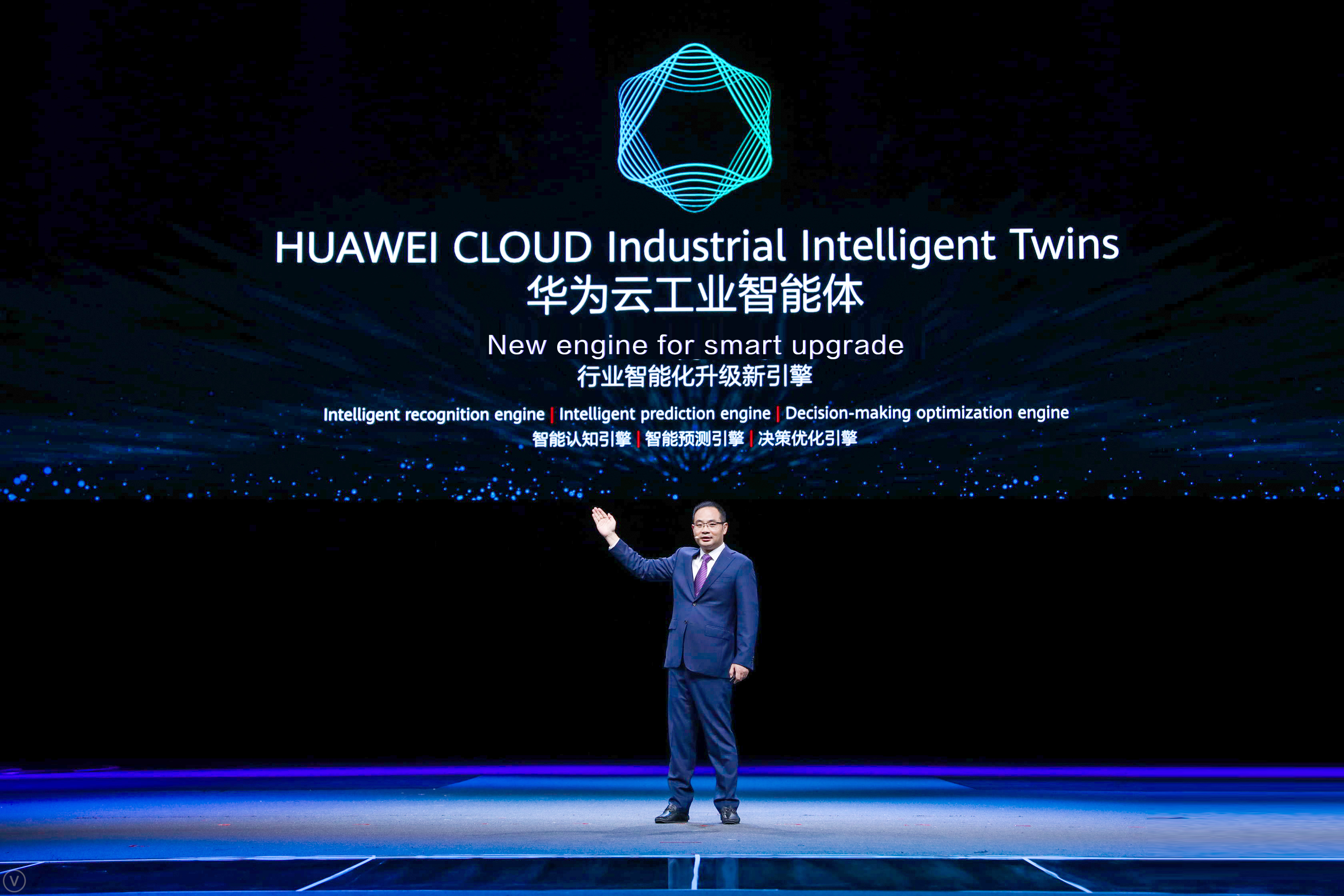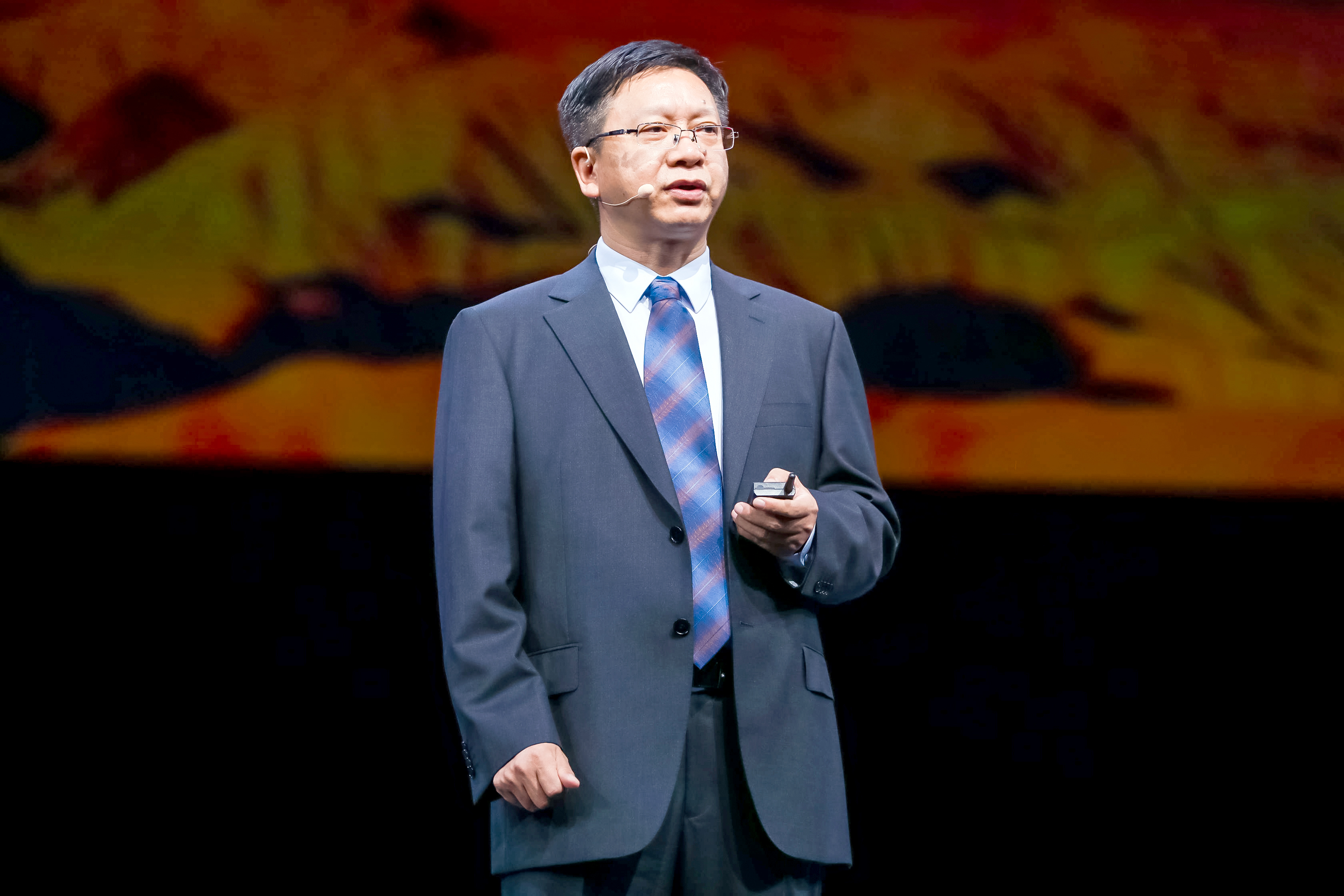HUAWEI CLOUD Launched EI Cluster Service and Industrial Intelligent Twins
Sep 18, 2019
[Shanghai, September 18, 2019] On the first day of HUAWEI CONNECT 2019, Zheng Yelai, the president of Huawei Cloud BU, delivered a speech titled "Crossing the Commercial Chasm – Building Inclusive AI". He proposed four keys to successfully implementing AI and announced the official launch of the cutting-edge EI Cluster Service and Industrial Intelligent Twins.
Mr. Zheng commented, "We have already built full-stack, all-scenario AI solutions; it is now time to bring AI implementation to the next level. HUAWEI CLOUD services will drive implementation forward. We will work with countless enterprises to bridge AI's commercial chasm so that AI can benefit and bring intelligence to every industry."
 Zheng Yelai Launched HUAWEI CLOUD Industrial Intelligent Twins
Zheng Yelai Launched HUAWEI CLOUD Industrial Intelligent Twins
Four Keys to Successful AI Implementation
Global investment is enthusiastic about AI. There is a chasm between investment and commercial application.
AI technology is burgeoning and demand for computing power is growing tenfold every year. Some new algorithms, such as BigGAN, have even witnessed hundredfold increases. To address these demands, computing power must become readily available, just like electricity.
Last year, Huawei proposed 3 major AI scenarios: repetitive, high-volume work; expert experience; and multi-domain collaboration. AI has thereafter been extensively applied to improve efficiency, transfer expertise, and go beyond human intelligence. So far, HUAWEI CLOUD Enterprise Intelligence has been successfully applied to more than 500 projects in 10 industries, including urban management, manufacturing, healthcare, automobile, campus, and Internet.
Mr. Zheng also commented that "to successfully implement AI, we must coordinate four key roles: clear business scenarios, ISVs/SIs, devices/processes, and AI platforms."
1. Clear business scenarios refer to well-defined boundaries and objectives, closed-loop scenarios, and sufficient data.
Some scenarios are complex but clear. For example, Sanlian Hope, a Chinese synthetic fiber technology provider, visually inspects filaments. Workers were only able to inspect the last 100 meters of each spool, raising possible quality assurance issues. Since 2018, Sanlian Hope has worked with HUAWEI CLOUD to use AI to improve synthetic fiber quality inspection. Now they can inspect the quality of each spool in its entirety of about 1000 kilometers.
Some scenarios, such as river restoration, are not as simple as they seem. AI needs to identify dropping, pouring, and floating litter in dark, rainy, and foggy conditions. HUAWEI CLOUD has optimized AI algorithms and improved the litter identification rate from 50% to 80%.
2. Readily available computing power. Currently, computing power is insufficient, expensive, and difficult to obtain. At Huawei, there are over 4000 AI training jobs each day, and total training time exceeds 32,000 hours. A large number of training jobs are waiting in the queue.
HUAWEI CLOUD now provides the world’s fastest EI Cluster Service, powered by Atlas 900, to provide developers with sufficient and cost-efficient computing power. This EI cluster consists of thousands of Ascend 910 processors and can complete the ResNet-50 training on ImageNet within only 59.8 seconds, 15% faster than its runner-up. Unlike traditional hardware, the EI Cluster Service can be provisioned instantly to provide flexibly scalable computing power to meet growing demands. Scientific research and business innovation can be accelerated with this EI Cluster Service. Image and voice training will become much faster. Astronomy, weather forecasting, oil exploration, and autonomous driving will develop at a much faster pace.
This powerful computing power is bolstered by full-stack optimization from the underlying hardware to the software architecture, including parallelism between gradient aggregation and minibatch computing; a processor-ToR-spine, convergence-free, high-speed network; and synergistic cloud computing, storage, and network.
3. Continuously evolving AI services. In the AI era, building an online, closed-loop system is critical. AI development, training, and production will continuously adapt to environmental changes. HUAWEI CLOUD's full-process AI development platform, ModelArts, adopts the iterative developing framework and provides device-edge synergy to accelerate AI development.
4. Well-matched organization and talent. AI should "Think Digital, Act Human". The talent, organization, and process must be well-matched to better serve humans. Shenzhen Airport worked with HUAWEI CLOUD to build an intelligent aircraft stand allocation system. The system frees operators from repetitive tasks by learning rules and analyzing valuable past experiences. Shuttle bus use was reduced as the flight docking ratio increased, improving passenger travel experience.
HUAWEI CLOUD Industrial Intelligent Twins, a New Engine for Industrial Intelligence
HUAWEI CLOUD officially released the Industrial Intelligence Twins for the manufacturing industry. As a new engine for intelligent industry transformation, it applies various technologies, such as knowledge graph–powered intelligent recognition engine, AI model–based intelligent prediction engine, and decision-making optimization engine.
The HUAWEI CLOUD Industrial Intelligent Twins has been applied to multiple fields, such as energy, mining, electric power, cement, and chemical fiber. For example, HUAWEI CLOUD cooperated with China National Petroleum Corporation (CNPC) to use the intelligent recognition engine to help identify hydrocarbon reservoirs, accelerating identification by 70%. HUAWEI CLOUD collaborated with Sanlian Hope to use the intelligent prediction engine, improving the customer requirement matching rate by 28.5%. HUAWEI CLOUD also worked with the Golden Stone Group to use the intelligent optimization engine to improve the coal blending and coke quality prediction accuracy to over 95%. This saved the company over CNY 10 per ton of coke, improving profitability by 16.6%.
CNPC and Huawei Joined Hands to Cross the Commercial Chasm in Industrial AI
Professor Gong Renbin, director of the Computing Application Technology Research Center at the Research Institute of Petroleum Exploration and Development, shared their best practices of using Huawei Industrial Intelligence Twins in oil and gas exploration.
In recent years, CNPC has been following its "sharing CNPC" informatization strategy, achieving remarkable results and significantly improving its comprehensive competitiveness. To advance intelligent exploration and development to new ground, CNPC and Huawei introduced the Industrial Intelligent Twins into production practices and used AI technologies such as knowledge maps, natural language processing, and machine learning. These technologies provide intelligent analysis for oil and gas exploration, research, and production management; increase oil and gas exploration and development efficiency while reducing costs; and help decision-makers improve efficiency and management effectiveness.
 Professor Gong Renbin shared CNPC’s practices
Professor Gong Renbin shared CNPC’s practices
The open and scalable cognitive computing platform jointly built by the two companies provides an intelligent engine and a development ecosystem for consolidating and transferring exploration and development knowledge. This platform has been used in hydrocarbon reservoir identification and pumping well condition diagnosis. Expert experience was leveraged to improve management.
Dagang Oilfield applied machine learning to identify oil and gas levels at 900 wells, accelerating evaluation by 70% while maintaining accurate identification. In the field of oil and gas production, the cognitive computing platform helps CNPC determine oil well conditions and remotely manage the wells in real time. The diagnosis accuracy in abnormal working conditions is higher than 90%. Oil field management shifts from post-event diagnosis to pre-event warning, reducing O&M costs by 20%. Eight oil production plants in the Qinghai Oilfield are now managed remotely.
Professor Gong added that "CNPC has succeeded in intelligent oilfield planning and design, and leveraged AI exploration in 22 scenarios. But this is just the start, and I expect smart applications to flourish and proliferate. CNPC and Huawei will continue to transform oil exploration and development."
HUAWEI CONNECT 2019 is a global annual flagship conference for the ICT industry held by Huawei from September 18 to 20, 2019 in Shanghai. With the theme of "Advance Intelligence", this conference aims to build an open, cooperative, and shared platform, and discuss with customers and partners how to seize new opportunities and create an intelligent future.


